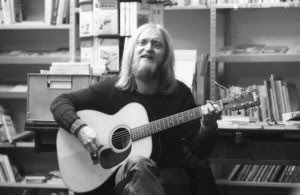The Festival of Political Songs was founded by the group Oktoberklub and took place in East Berlin every February from 1970-1990 as an official event of the Free German Youth. The event was first organized by the Berlin division, but from 1975 on was directed by the Central Committee of the Free German Youth.
Artists from 60 countries participated in the event during its durations, and the event would usually feature between 50 and 80 artists across around 30 countries. Prominent artists who have performed at the festival include Mikis Theodorakis, Miriam Makeba, Quilapayún, Inti-Illimani, Silvio Rodríguez, Mercedes Sosa, Gabino Palomares, Canzoniere delle Lame, and Pete Seeger accompanied by Chilean-exile and Berkeley based folk group Grupo Raiz.The mascot of the festival was a red sparrow named Oki (derived from Oktoberklub).
After the collapse of East Germany, the festival lost financial support and infrastructure. In order to continue the tradition, a new festival called the ZwischenWelt Festival was held between 1991 and 1995. Its supporting organization dissolved in 1995 because of financial difficulties.
Here´s the album with the recordings from the "18. Festival des politischen Liedes" in February 1988.
Tracklist:
Side One:
Raha Manina - Rossy (Paul-Bert Rahasimanana)
Peace, Love And Understanding - Julian Dawson & Colin Rose (Julian Dawson & Nick Lowe)
Cha Chimurenca - Stella Chiweshe (Stella Chiweshe)
Through Soveto - Sweet Honey In The Rock (Traditional)
Tewle - Yarinistan/Morgenland (Traditional)
Lorelei - Manifest (11) (Michael Schenk & Gerd Eggers)
Anjelito - Amparo Ochoa (Ricardo Rojas)
Side Two:
Aboriginal Woman - No Fixed Adress (Bart Wiloughby)
There Were Roses - The Sands Family (Tom Sands)
So Ist Das Leben - Norrlatar (Björn Sjöö)
Besnuites - Smena (C. Krschischanowski)
My Old Man - Peggy Seeger & Ewan McColl (Ewan McColl)
Naschid El Riegel - Al Wilada (Abdallah El-Masri & Mammud Darwisch)
Solo Le Pido A Dios - Norma Gadea, Amparo Ochoa, Maria Da Paz & Tania Libertad (Leon Gieco)
VA - 18. Festival des Politischen Liedes (1988, Amiga)
(320 kbps, cover art included)





























